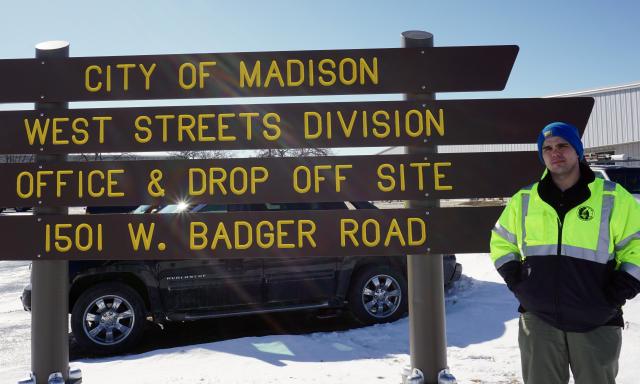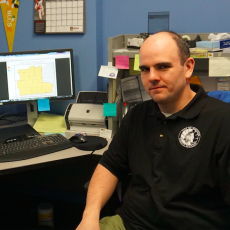






 In addition to being the recycling coordinator, Johnson is also the public information officer for the Streets Division. In this role, he answers questions about services like plowing, street maintenance and trash collection.
In addition to being the recycling coordinator, Johnson is also the public information officer for the Streets Division. In this role, he answers questions about services like plowing, street maintenance and trash collection.
George Dreckmann, Madison’s recycling coordinator for 26 years, was known as a recycling guru by the time he retired earlier this year. During his tenure, Dreckmann established Madison’s organics composting program and courted recyclers with enthusiastic YouTube videos like “Things You Might Not Know You Can Recycle.”
Bryan Johnson, who took over for Dreckmann in January, knows he replaced a big name.
“He set a very high bar to clear, so I think my goal is to just do my best to keep it going, expand where we can and go from there,” Johnson said.
As the recycling coordinator and the Streets Division public information officer, Johnson spends most of his time fielding questions from the public and providing detailed answers. He has an impressive resume of previous positions, all of which involve working with the public, research and explanation: a fifth-grade teacher, a customer service agent, a college writing instructor (while completing his Master of Fine Arts in creative writing), a police report typist and an operations clerk with the Streets Division, the same division that houses recycling.
In his current role, common questions include whether or not garden hoses are recyclable (they’re not), what to do with old TV sets or used cooking oil (both are accepted at the two city drop-off sites) and when leaf piles will be cleared (see question 3 of the quiz below). Some have quick answers; others require Johnson to call his contacts at Pellitteri, the company that processes the recycling collected in green bins by the city. (The Streets Division uses other companies to process special items brought to drop-off sites.)
 Johnson took over for Madison’s longtime recycling coordinator George Dreckmann earlier this year. He hopes to grow the organics program Dreckmann started. (Cara Lombardo/Madison Commons)If you’ve never thought about what happens to recycling after it leaves your house, Johnson recommends this video from Pellitteri, which follows its astonishing journey. Observing exactly how paper and plastic gets sorted and how the machinery responds to loose plastic bags answers questions you may not have realized you had.
Johnson took over for Madison’s longtime recycling coordinator George Dreckmann earlier this year. He hopes to grow the organics program Dreckmann started. (Cara Lombardo/Madison Commons)If you’ve never thought about what happens to recycling after it leaves your house, Johnson recommends this video from Pellitteri, which follows its astonishing journey. Observing exactly how paper and plastic gets sorted and how the machinery responds to loose plastic bags answers questions you may not have realized you had.
Take particular note of the first group of quality control workers at 1:05: The heaps of materials rushing past them should give you pause next time you throw something in the recycling that you’re not quite sure about. When in doubt, check the Street’s Division’s very thorough website or, if you can’t find an answer, call and ask.
In addition to keeping up with a steady flow of questions, Johnson thinks long-term. He hopes to grow the organics program by increasing the amount of participants to 1,600 from 1,000 this year. Not only does the organics program create high-quality compost, but methane released during the digestion process generates electricity that is sold to MGE.
When decisions are being made about what to prioritize, Johnson said, “It’s always about trying to find next big piece out of waste stream that we could try to divert.”
“First you want to worry about the toxicity of things. Mercury, for example, can’t go in the trash,” he said. Enter thermometer, light bulb and battery recycling programs. “Then volume. What takes up the most space that you could try to divert?”
A study that found food matter comprised a large portion of waste led to the creation of the organics program. Johnson hopes to tackle mattresses next.
They already offer mattress recycling, but it is expensive and labor-intensive. “There’s not a good way to break them down,” Johnson said. “Essentially, it’s people with razor knives cutting them open and doing it by hand.”
As with all recycling projects, the solution needs to be feasible both environmentally, financially and logistically. The ideal solution will keep as many mattresses as possible out of landfills, come at a price the city can afford and involve a collection method that is convenient for residents.
While Johnson spends his days strategizing and answering other people’s questions, he knows there’s someone who can answer his own.
“I’m considering George an unpaid consultant right now,” Johnson said of Dreckmann, who he briefly shadowed. “As issues come up, or if there’s something I’m missing, he’s an email or phone call away.”
---
Quiz: Are you recycling day-ready?
Test your City of Madison recycling knowledge to ensure only recyclable items go into your bin. Still have questions? Check the Streets Division’s website.
1. Which three items of the following are not recyclable?
A. Glossy magazine
B. Loose beer bottle caps
C. Red Solo cups
D. Plastic water bottle
E. Tissue paper for gift-wrapping
F. Juice boxes
2. Which statement about plastic bottles is true?
A. Plastic bottles, such as Gatorade bottles, are not recyclable and neither are their lids.
B. Plastic bottles, such as Gatorade bottles, are only recyclable without their lids.
C. Plastic bottles, such as Gatorade bottles, are recyclable with the lid only if it is on the bottle.
3. Which statement about leaf and brush collection is false?
A. Leaf and brush should not go into your recycling bin.
B. After the spring thaw, the Streets Division posts a schedule online listing exactly which days they will be in each zone.
C. After the spring thaw, the Streets Division keeps an updated map online of which zones they are currently in and going to next. Where they are when depends on how quickly they move through each zone, so it’s important to check the website.
D. If you miss your pick-up day, you can always bring leaf and brush directly to a drop-off site.
4. What is the correct way to recycle plastic bags?
A. Drop them off at department stores or grocery stores; they aren’t recyclable in your bin.
B. Throw them in your recycling as you would any other item.
C. Put them all into one bag to prevent loose bags from getting stuck on the sorter.
D. Bring them to one of the two drop-off sites and put them in the bin labeled “Plastic Bags.”
Correct answers:
1BCE; 2C; 3B; 4C (see this video).
|
|
|
Welcome to the Madison Commons, a website designed to provide news and information about all of Madison's neighborhoods and a crossroads for the discussion of community issues. The name comes from the idea of a village commons, a place for news, talk, debate, and some entertainment, too, that's open to everyone.
All rights reserved. Read more about the Madison Commons and its partners.

